#Mitsuko Mito
Explore tagged Tumblr posts
Text

#movies#polls#ugetsu#ugetsu 1953#ugetsu movie#50s movies#kenji mizoguchi#machiko kyō#mitsuko mito#kinuyo tanaka#masayuki mori#eitarō ozawa#have you seen this movie poll
41 notes
·
View notes
Text

On set photo of Ugetsu (1953) | 雨月物語
with Masayuki Mori, Machiko Kyō, the film's director Kenji Mizoguchi, & Mitsuko Mito
#masayuki mori#machiko kyō#kenji mizoguchi#mitsuko mito#ugetsu (1953)#ugetsu monogatari#1950s#on set photo#classic film#classic film stars#film director#japanese cinema#jidaigeki#vintage#my post
6 notes
·
View notes
Photo

Masayuki Mori and Machiko Kyo in Ugetsu (Kenji Mizoguchi, 1953)
Cast: Machiko Kyo, Mitsuko Mito, Kinuyo Tanaka, Masayuki Mori, Eitaro Ozawa. Screenplay: Matsutaro Kawaguchi, Yoshikata Yoda, Isamu Yoshii, based on stories by Akinari Ueda. Cinematography: Kazuo Miyagawa. Production design: Masatsugu Hashimoto. Film editing: Mitsuzo Miyata. Music: Fumio Hayasaka, Tamekichi Mochizuki, Ichiro Saito.
When does beauty become a flaw? To put it another way, if beauty is only skin deep, how does an artist present it so that we don't linger on the surface of a work and fail to comprehend its depths? I raise this in connection with a viewing of Kenji Mizoguchi's Ugetsu, a film universally praised for its beauty. It's easy to be mesmerized by Mizoguchi's visual compositions and by the sinuous fluidity of Kazuo Miyagawa's cinematography, as well as the poetry of the screenplay, all at the expense of feeling the coherence of the film's story and characters and ideas with our own lives. I find myself preferring Mizoguchi's less exquisite films to Ugetsu: Sansho the Bailiff (1954), surely, but also The Life of Oharu (1952) and even an earlier film like Osaka Elegy (1936). A case in point: The scene in which Genjuro (Masayuki Mori) returns home after his dalliance with the ghostly Lady Wasaka (Machiko Kyo) is a crucial and mythic one, evoking among other things Odysseus's return to Ithaca. And Mizoguchi stages it memorably: Genjuro enters the near-ruin of his house and finds it empty and littered, the fire pit cold. The camera follows him through the house in a long unbroken take, watches as he goes out the back door and sees him through the windows as he circles the house and re-enters. Only this time when he enters, the room is clean and the fire is burning brightly; his wife, Miyagi (Kinuyo Tanaka), embraces him. Overwhelmed and exhausted, he lies down and falls into a deep sleep beside his son, only to wake in the morning to find the cold empty room he first entered and to learn that Miyagi is dead. It's a magnificent sequence, a tour de force of acting, directing, camerawork and editing. It makes a larger, deeper point: that Genjuro will never escape from ghosts. A less gifted director than Mizoguchi would have used conventional techniques like dissolves or double exposures to make the point. But there's also something distracting about instead employing a long, circular tracking shot with an invisible cut: We marvel at the technique at the expense of sharing Genjuro's experience. There is an art that conceals art, and I don't think Mizoguchi attains it here.
4 notes
·
View notes
Text





Flame of My Love (1949)
dir. Kenji Mizoguchi
#flame of my love#flame of my love 1949#kenji mizoguchi#japanese cinema#film#japanese movie#movie quotes#films#movies#japanese film#japan#movie#movie quote#film quote#kuniko miyake#kinuyo tanaka#mitsuko mito
118 notes
·
View notes
Photo
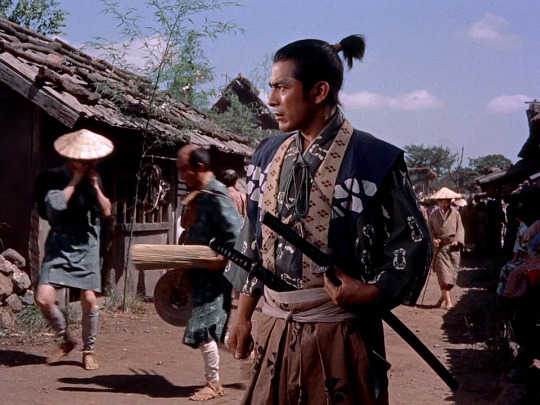
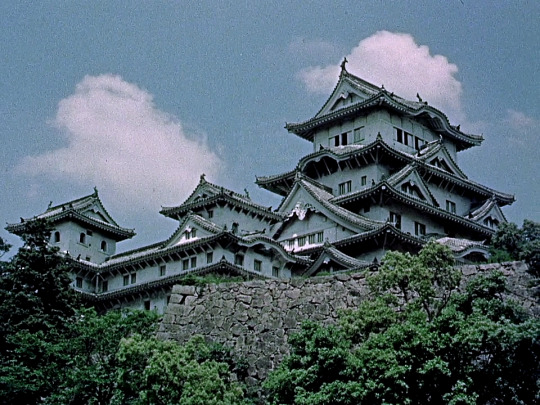


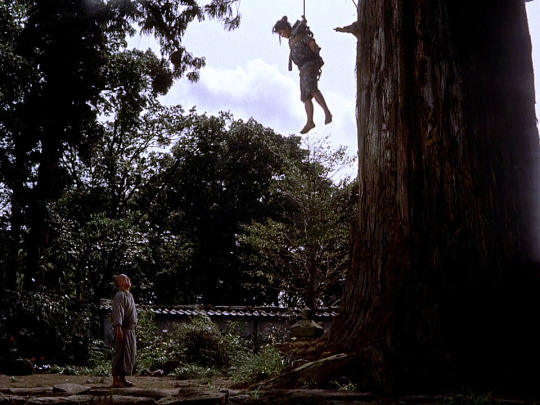
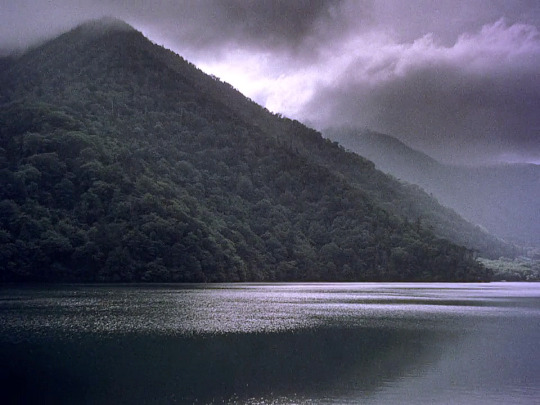



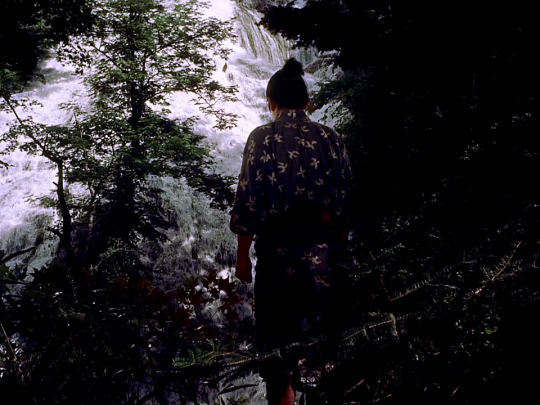
Samurai I: Musashi Miyamoto // 宮本武蔵 (1954)
Dir. : Hiroshi Hinagaki
#Samurai: La Légende de Musashi#Samurai I: Musashi Miyamoto#Musashi Miyamoto#Hiroshi Hinagaki#cinema#Toshiro Mifune#Rentaro Mikuni#Kaoru Yachigusa#Kuroemon Onoe#Mariko Okada#Mitsuko Mito#1954#50's#Japan#samurai#olvaset
103 notes
·
View notes
Photo

#hiroshi inagaki#kiss#la légende de musashi#mitsuko mito#miyamoto musashi#no#samurai#samurai i musashi miyamoto#surprise#toshiro mifune#turn#宮本武蔵
67 notes
·
View notes
Photo










Flame of My Love / Waga koi wa moenu (1949, Kenji Mizoguchi)
わが恋は燃えぬ (溝口健二)
11/5/20
#40s#Flame of My Love#Waga koi wa moenu#Kenji Mizoguchi#Kinuyo Tanaka#Mitsuko Mito#Kuniko Miyake#Ichiro Sugai#Eijiro Tono#drama#Japanese#romance#melodrama#Meiji#feminism#liberal#activism#activists#politics#19th Century#prison#sexism#feminist#rape#teachers#protest
4 notes
·
View notes
Photo










Miyamoto Musashi (1954)
#miyamoto musashi#宮本武蔵#samurai i: musashi miyamoto#la légende de musashi#hiroshi inagaki#toshiro mifune#mariko okada#mitsuko mito#kaoru yachigusa
64 notes
·
View notes
Photo

Onna,1948 (dir. Keisuke Kinoshita)
33 notes
·
View notes
Photo

Ugetsu Monogatari | Kenji Mizoguchi | 1953
Mitsuko Mito, Kinuyo Tanaka, Eitarô Ozawa, Masayuki Mori
#Mitsuko Mito#Kinuyo Tanaka#Masayuki Mori#Eitarô Ozawa#Kenji Mizoguchi#Mizoguchi#Ugetsu Monogatari#1953#Ugetsu
35 notes
·
View notes
Photo










Senso To Nigen (Satsuo Yamamoto, 1970)
39 notes
·
View notes
Text
FilmStruck Friday: Onna (aka Woman) (1948)
It's FilmStruck Friday on TMP. Review of Kinoshita's ONNA:
Welcome to this week’s edition of FilmStruck Friday! Every Friday here on TMP, with the exception of the first Friday of the month (which is reserved for “Favorite things about…”), we’ll be taking a look at a film available through the TCM and Criterion Collection streaming service. Today’s film comes from 1948 – Woman, directed by Keisuke Kinoshita. Happy viewing! Toshiko (Mitsuko Mito) is a…
View On WordPress
1 note
·
View note
Photo

Mitsuko Mito and Eitaro Ozawa in Woman (Keisuke Kinoshita, 1948) Cast: Mitsuko Mito, Eitaro Ozawa. Screenplay: Keisuke Kinoshita. Cinematography: Hiroshi Kusuda. Art direction: Kazue Hirataka. Film editing: Yoshi Sugihara. Music: Chuji Kinoshita. Keisuke Kinoshita can often be accused of either trying too much or not trying enough. Both faults are on display in his Woman, a noirish story of a thief and his mistress. Kinoshita's love for trying out effects that don't quite work is on display in the artily tilted camerawork that adds an expressionist note to scenes that don't really demand it. It's the sort of thing that a film student might attempt for a class, not something you expect from a director who had been working for five years and already had eight features to his credit, including the well-received Morning for the Osone Family (1946). Still, the scenes are shot well by Kinoshita's regular cinematographer, Hiroshi Kusuda. Where Kinoshita gets sloppy is more troubling: The dialogue is badly post-synched, especially noticeable in the extreme closeups that dominate the film toward the end. And once again, Kinoshita lets his brother Chuji's score meander around behind scenes where it feels awkwardly matched to the mood. But Woman is also one of Kinoshita's better films, overcoming its weaknesses with a fine economy of story. It's only a little over an hour long, but it packs a lot of intensity of feeling into that run time. Eitaro Ozawa plays Tadashi, a crook who has just made a big score with a home invasion and persuades his mistress, Toshiko, played by Mitsuko Mito, to go on the run with him to a seaside resort where he will meet up with his accomplices and settle up the proceeds of the theft. She has a steady gig as a dancer in the chorus of a musical revue that she's reluctant to ditch, but he's persuasive in his own brutally infatuated way. The bulk of the film deals with their on-again, off-again relationship: Will she stay or will she go? Ozawa is the more expressive of the two actors, which is fine because he has the more volatile role, switching in an instant from anger at her reluctance to pleading for her submission to menacing her with a knife. Mito's face can be inexpressive at key moments, making Toshiko a rather enigmatic character, but she manages to suggest the deep conflict at work within: Having risen from bar hostess (a step up from prostitution) to chorus girl, she seems to think her life has taken an upward turn that staying with Tadashi might reverse, even though he promises her a life of riches. The denouement comes when Tadashi asks her to sell a piece of the stolen goods for him. She refuses, but just at that moment there's a shout of "Fire!" and people start running to see the burning building. The keeper of the shop where Tadashi plans to sell the loot steps out to join the rubberneckers, pulling the door shut behind him but not locking it, and to Toshiko's horror, Tadashi takes the opportunity to slip into the store and filch some more goodies. She decides enough is enough and tries to run away, with Tadashi in pursuit through a gathering crowd. Kinoshita stages the fire and the melee around it very well, giving some needed action to what has been a rather talky film. In the end, Tadashi is caught and Toshiko returns to the chorus line, a somewhat flat and anticlimactic ending to a film that has generated some real tension.
1 note
·
View note
Text
Grey – White Hype – Ugetsu Monogatari
Grey – White Hype – Ugetsu Monogatari
This revered favourite of numerous filmmaking masters – Scorsese, Tarkovsky, etc. – has left me cold. It is an admirable feat of visual and narrative storytelling that in the end gave me much to ponder but little to cherish. Set in 16th century civil war Japan, Ugetsu Monogatari (1953) tells the story of two couples – Genjuro (Masayuki Mori), Miyagi (Kinuyo Tanaka), Tobei (Eitarô Ozawa) and…

View On WordPress
#16th century#Andrey Tarkovsky#auteurism#Buddhism#disappointment#early modernism#Eitaro Ozawa#feudal Japan#ghosts#Hisakazu Tsuji#hype#Japanese film#Kenji Mizoguchi#Kinuyo Tanaka#Machiko Kyo#Martin Scorsese#Masayuki Mori#Matsutaro Kawaguchi#Mitsuko Mito#supernatural drama#Tales of Moonlight and Rain#Ueda Akinari#Ugetsu monogatari#Yoshikata Yoda
1 note
·
View note
Photo

#drink#duel à ichijoji#hiroshi inagaki#mitsuko mito#samurai ii duel at ichijoji temple#zoku miyamoto musashi ichijōji no kettō#続宮本武蔵 一乗寺の決闘
15 notes
·
View notes
Photo










The Tale of Genji / Genji Monogatari (1951, Kōzaburō Yoshimura)
源氏物語 (吉村公三郎)
10/17/19
#50s#The Tale of Genji#Genji Monogatari#Kazuo Hasegawa#Michiyo Kogure#Machiko Kyo#Nobuko Otowa#Mitsuko Mito#Chieko Higashiyama#Chieko Soma#drama#Japanese#Japanese Golden Age#book adaptation#emperors#princes#royalty#court#Heian#poetry#romance#Kozaburo Yoshimura#beauty#Kyoto#jealousy#obsession#womanizers#concubines
36 notes
·
View notes